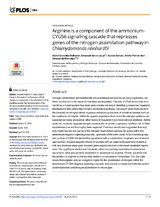Mostrar el registro sencillo del ítem
Arginine is a component of the ammonium- CYG56 signalling cascade that represses genes of the nitrogen assimilation pathway in Chlamydomonas reinhardtii
| dc.contributor.author | González-Ballester, David | |
| dc.contributor.author | Sanz-Luque, Emanuel | |
| dc.contributor.author | Galván Cejudo, Aurora | |
| dc.contributor.author | Fernández Reyes, Emilio | |
| dc.contributor.author | Montaigu, Amaury de | |
| dc.date.accessioned | 2018-05-02T07:45:18Z | |
| dc.date.available | 2018-05-02T07:45:18Z | |
| dc.date.issued | 2018 | |
| dc.identifier.uri | http://hdl.handle.net/10396/16550 | |
| dc.description.abstract | Nitrogen assimilation and metabolism are essential processes for all living organisms, yet there is still much to be learnt on how they are regulated. The use of Chlamydomonas reinhardtii as a model system has been instrumental not only in identifying conserved regulation mechanisms that control the nitrogen assimilation pathway, but also in understanding how the intracellular nitrogen status regulates metabolic processes of industrial interest such as the synthesis of biolipids. While the genetic regulators that control the nitrogen pathway are successfully being unravelled, other layers of regulation have received less attention. Amino acids, for example, regulate nitrogen assimilation in certain organisms, but their role in Chlamydomonas has not thoroughly been explored. Previous results had suggested that arginine might repress key genes of the nitrogen assimilation pathway by acting within the ammonium negative signalling cascade, upstream of the nitric oxide (NO) inducible guanylate cyclase CYG56. We tested this hypothesis with a combination of genetic and chemical approaches. Antagonising the effects of arginine with an arginine biosynthesis mutant or with two chemical analogues released gene expression from ammonium mediated repression. The cyg56 and related non1 mutants, which are partially insensitive to ammonium repression, were also partially insensitive to repression by arginine. Finally, we show that the addition of arginine to the medium leads to an increase in intracellular NO. Our data reveal that arginine acts as a negative signal for the assimilation of nitrogen within the ammonium-CYG56 negative signalling cascade, and provide a connection between amino acid metabolism and nitrogen assimilation in microalgae. | es_ES |
| dc.format.mimetype | application/pdf | es_ES |
| dc.language.iso | eng | es_ES |
| dc.publisher | Public Library of Science | es_ES |
| dc.rights | https://creativecommons.org/licenses/by-nc-nd/4.0/ | es_ES |
| dc.source | PloS ONE 13 (4): e0196167 (2018) | es_ES |
| dc.subject | Nitrogen metabolism | es_ES |
| dc.subject | Nitrogen assimilation | es_ES |
| dc.subject | Chlamydomonas | es_ES |
| dc.subject | CYG56 | es_ES |
| dc.title | Arginine is a component of the ammonium- CYG56 signalling cascade that represses genes of the nitrogen assimilation pathway in Chlamydomonas reinhardtii | es_ES |
| dc.type | info:eu-repo/semantics/article | es_ES |
| dc.relation.publisherversion | https://doi.org/10.1371/journal.pone.0196167 | es_ES |
| dc.relation.projectID | Gobierno de España. BFU2015- 70649-P | es_ES |
| dc.relation.projectID | Junta de Andalucía. BIO-502 | es_ES |
| dc.rights.accessRights | info:eu-repo/semantics/openAccess | es_ES |

